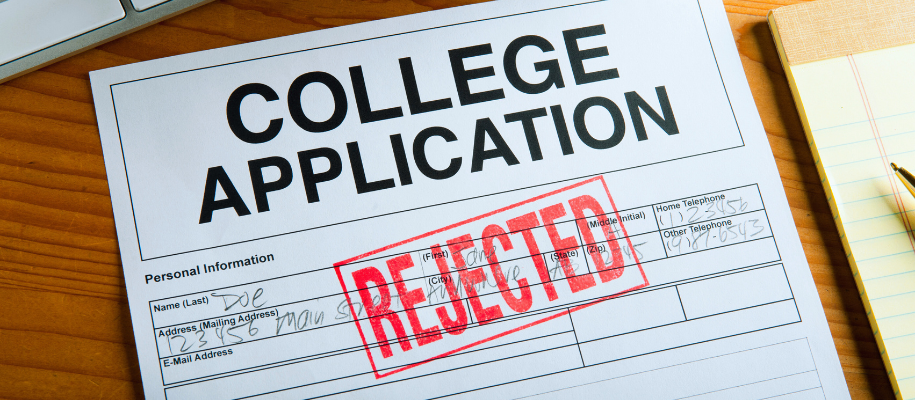As college decisions begin to arrive, high school seniors are experiencing a roller coaster ride of emotions. Sometimes we open that email or status update or letter and jump for joy. Other times we have our hopes dashed by our first-choice college. Trust me—I’ve been in both situations, and it’s hard to deal with the exuberance of one and the depressing reality of the other. What’s important to remember is that you were not rejected simply because you’re you. It comes down to much more than that. I thought I would write this as a summary of a very long conversation I had with my mom after I was rejected from a couple of colleges. She asked some very good questions that I promise will help you see past that thin envelope.
1. Did you actually want to go to that school?
I got my first rejection from a college that was out of state. I had already been accepted to four other schools at the time, but they were not my original top choices. This school, realistically, wasn’t my top choice either, and I had said just days before the news came that I didn’t really want to go there anyway. It’s hard to force yourself to remember that after a rejection, but try to anyway. Did you actually want to go to the school? If the answer is no, what are you so upset about? You got rejected, but you wouldn’t have even considered the school a possibility anyway. If the answer is yes, keep reading.
Related: How to Find Great-Fit Colleges for Your Goals
2. How high was the school on your list?
My second rejection came from a school that I was actually seriously considering. I was pretty devastated that I didn’t get in, but my mom sat down with me and made me rank my colleges. That school I just got rejected from didn’t even end up in the top four. It was an option but not the best one for me. I had already gotten into two out of my top four schools, and I was upset over the fact that I didn’t get into #6. Sound familiar? I bet some of you are now realizing that you’ve done the same thing. Try to keep perspective when thinking about college.
3. Why did they reject you?
This one is a bit tougher to answer, as it varies by school, but the answer may not be what you think it is. For instance, I was accepted into my top choice school—a college with a 13% acceptance rate. The next day, a school with a 24% acceptance rate turned me down. This school ranked far below my first choice and probably wasn’t a great fit for me, but I was still upset about the numbers. I asked myself, how could I, a student with straight A’s and pretty good test scores, not get into what I thought was a target school? What you have to force yourself to remember is that not all acceptances are just about grades and test scores. Sometimes it’s about culture and “fit.” You could be a top applicant for a school on paper and still not get in because the admission office there recognizes that you would not do well at their college. Admission staff are pros at this—they know exactly the type of person who will thrive at their school, and if you aren’t that type, they won’t accept you! They want to save everyone the trouble of realizing that for themselves one semester in. It’s better to get rejected from a school that wouldn’t be right for you than to be accepted, start attending, and realize you made the wrong choice.
4. Why do you care about the rejection?
This was another really tough question that I had to come to terms with. At first, I spouted out fake answers, like “I really liked the school” or “I wanted more options.” Soon enough, though, I got down to the cold, hard truth: I was embarrassed. And I’m sure many of you are in the same boat as well. It can seem embarrassing to get rejected from a college, especially if you were sure you were going to get in. You have to tell all your friends and family members who ask about it, and it feels like that rejection will be a permanent stain on the résumé of your life. I was so attached to getting into every school that I didn’t even think about the colleges and universities where I had already been accepted. It’s important not to get hung up on those rejections and instead focus on the positives. If you’re still waiting on an acceptance, don’t stress. There is plenty of time to get that big envelope, and I’m sure you will be okay.
Related: Some Tough Love Advice to Help You Get Over a College Rejection Letter
So, the lesson for those of you who aren’t seniors and are reading this—choose the colleges you apply to wisely. After I applied to all my schools, I realized I was only truly interested in about five out of the 11 schools I applied to. Don’t be like me. When applying to colleges, make sure you are happy with all your choices, including the school’s academics, social scene, campus culture, and more. There is so much to think about when choosing where to apply, so don’t be too hasty. It’s better to apply to a small number of colleges that you love than a huge list of schools where you only care about 40% of them. It can save you a lot of unnecessary heartache in the long run.






